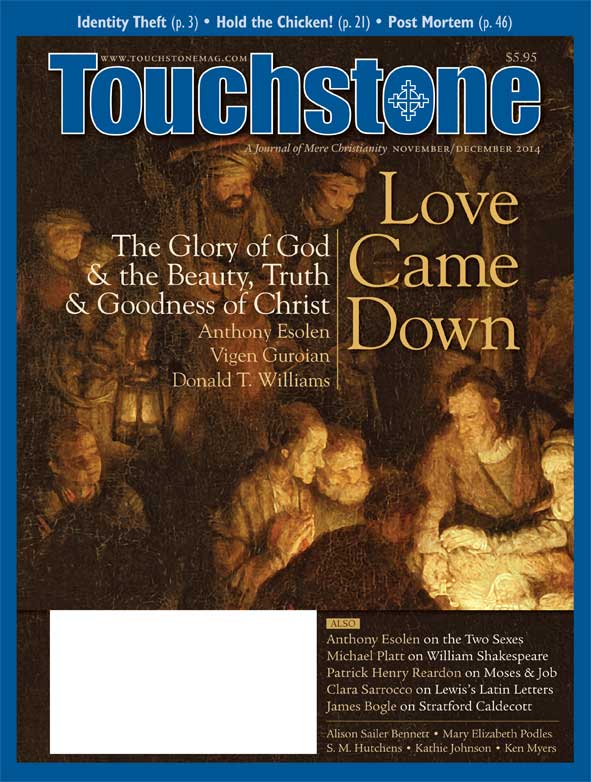View
Moses & Job
Patrick Henry Reardon on the Meekest of the Servants of God
The patriarchal setting of the Book of Job prompted some rabbis to speculate that Moses himself was its author (Talmud, Baba Bathra 14b). Although nobody today, as far as I know, holds that opinion, it is not without its attraction, especially if one considers certain affinities between the two men.
Most notable among these, perhaps, was the shared meekness of Moses and Job. Both could be called 'anav, a Hebrew word signifying poverty of spirit. This adjective is often translated as "poor," but it indicates a spiritual quality, better rendered as "meek."
Thus, Job appears to include himself when he speaks of the 'anevei 'ares,"the meek of the land" (Job 24:4). Meekness certainly describes the patience with which the man of Uz accepts his sufferings, particularly the psychological pain inflicted by his three so-called comforters. These self-righteous men, who are the very opposite of meek, bring this quality of Job into sharper prominence.

As for Moses, we are told he was 'anav me'od mikkol ha'adam, "meek beyond all mankind" (Num. 12:3). The meekness of Moses, I suppose, was most obvious when he endured the sundry complaints of those cantankerous Israelites, who daily burdened his life in the desert.
In this respect, we should observe that both Moses and Job are portrayed, not as giants on the earth, but as ordinary men, frail human beings. Each of them is introduced simply as a "man," an 'ish. As though foretelling Job's story as a whole, this noun is the first word used to describe him: 'ish hayah, "a man there was." Not a champion, not a hero, just a man.
The same noun, 'ish, is used of Moses in the very place where he is called "meek." The verse begins, weha'ish Mosheh 'anav, "the man Moses was meek" (Num. 12:3).
This description of "the man Moses" comes between two stories in which his desert compatriots put his patience severely to the test. So hard was the first trial that Moses complained to God, "Why have you afflicted your servant? Why have I not found favor in your sight that you should lay on me the burden of all these people?" (Num. 11:11). This problem is barely settled when Moses next finds himself challenged by his brother and sister, who demand to know, "Has the Lord indeed spoken only through Moses? Has he not spoken through us also?" This is the setting in which "the man Moses was meek beyond all mankind."
Different Kinds of Servants
The Lord's response to the complaint of Aaron and Miriam bears close inspection and should be compared with the response he gives to the comforters of Job. We will examine the two cases together. I want to do this according to the Greek text, where the parallels between the two accounts—as I hope to demonstrate—are intentionally crafted by the translator of Job.
Patrick Henry Reardon is pastor emeritus of All Saints Antiochian Orthodox Church in Chicago, Illinois, and the author of numerous books, including, most recently, Out of Step with God: Orthodox Christian Reflections on the Book of Numbers (Ancient Faith Publishing, 2019).
subscription options
Order
Print/Online Subscription

Get six issues (one year) of Touchstone PLUS full online access including pdf downloads for only $39.95. That's only $3.34 per month!
Order
Online Only
Subscription

Get a one-year full-access subscription to the Touchstone online archives for only $19.95. That's only $1.66 per month!
bulk subscriptions
Order Touchstone subscriptions in bulk and save $10 per sub! Each subscription includes 6 issues of Touchstone plus full online access to touchstonemag.com—including archives, videos, and pdf downloads of recent issues for only $29.95 each! Great for churches or study groups.
Transactions will be processed on a secure server.
more from the online archives
calling all readers
Please Donate
"There are magazines worth reading but few worth saving . . . Touchstone is just such a magazine."
—Alice von Hildebrand
"Here we do not concede one square millimeter of territory to falsehood, folly, contemporary sentimentality, or fashion. We speak the truth, and let God be our judge. . . . Touchstone is the one committedly Christian conservative journal."
—Anthony Esolen, Touchstone senior editor









